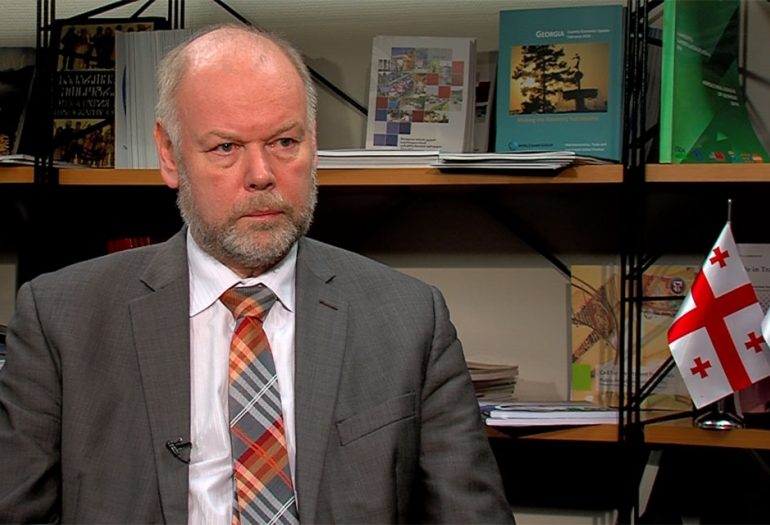By 2020, the World Bank forecasts average of 5% economic growth in Georgia. Besides, according to World Bank’s forecast, before the end of the year, inflation rate will return to the NBG’s targeted 3% and the current account deficit will reduce to 9% by the end of the year. During the current year, the Ban expects 4,3% growth of Georgia’s economy. 4,6% economic growth is forecasted for the next year and in 2020 economy is expected to grow by 5%. Hans Timmer, the Chief Economist of the World Bank, connects these improved rates with increased export:
What is the World Bank forecast for the economy of Georgia, what do you think about the business environment in Georgia?
Average economic growth in Georgia is 4,5%. Compared to other countries, this rate is quite high. We see the improvement of fiscal policy as well as quite an increase of export. This is related to one issue which is not very popular in Georgia – depreciation of lari. Depreciation of lari was inevitable. From the macroeconomic point of view, we still see major current account deficit. Import is still quite large in the country, which might result from electricity import increasing in Georgia.
National Bank should ensure stability of prices, which would also strengthen the trust to national currency. This doesn’t mean that taking into account international conditions the exchange rate will always be the same – it will be dependent upon international shocks, like, for example, oil prices in 2014. Lari may depreciate at any moment and you can’t change that, whatever the monetary policy rate is.
While being in Tbilisi you visited our Technological Park, where almost all Georgian start-ups are collected. One of the main problems most frequently stated by start-ups is related to access to financing. What should be the source of financing for them, while for banks financing of start-ups is a high-risk project?
I really like the idea of the Technological Park, where under the same umbrella start-up businesses are equipped with technologies, supported for introduction to international markets and attraction of financing. Financing is always an issue for start-ups. It is quite difficult for commercial banks to finance start-up businesses. They need guarantees in the first place. Banks can not issue high risk loans. That is why start-ups need venture capital, so-called angel investors and if you don’t find them in Georgia, you should look for them abroad.
In Georgia, the government took over the responsibility to finance start-up businesses. The state also allocated some social funds for this purpose. Do you think it is a good idea for the government to take such a risk?
It is right, if there is an expectation of positive effect. I believe that start-ups, represented in technological sector, for instance, will achieve this effect. If you have several success stories in the country, this will become a stimulus for others. It is not the government’s business to replace the banking system or venture capital through financing start-ups, but it is acceptable for the start.
The World Bank always notes that in Georgia the number of higher education institution graduates accedes the demand for labor. In your opinion, how could such a mismatch be quickly eliminated?
A lot of things develop in right direction in Georgia, however, there are several issues in the educational system. Education quality is quite low in Georgia, compared to other countries. Also, the difference between the quality of education in different regions of the country is quite big. For instance, in Tbilisi quality is much higher than in other regions. Often, students obtain knowledge and skills, which are irrelevant for the market demand. Solving of this problem is time consuming. Introduction of a correct plan would be a good signal for investors. Interaction between schools and private sector should also be improved, you should prioritize the education of future, which prepares young people not only for the today’s labor market but also for future. We prepare schools for the 21st century.
Georgia is starting a pension reform, in elaboration of which the World Bank has been actively involved. However, some organizations are having questions regarding the current model. Do you think the model introduced by the government is acceptable?
Currently Georgia has a fixed pension system, which we call a first pillar pension, which is fully provided by the state. The pension reform implies transition to the second pillar. Many developed countries are using this model. This mechanism ensures bringing pension closer to income. Also, this creates savings, which in case of Georgia are quite small. This allows for investments in future and facilitates development of financial market. Pension contribution is modest, but very much needed.
That is one of the main questions: many people think that this is a tax and people don’t like paying taxes…
This is a wrong attitude, since this is not a tax. It can not be considered as tax since this is a saving, later used by this person. Many developed countries are using this system and people who are well-paid during their carrier get more. This is a much better system than voluntary savings. So, this is not a tax.
















